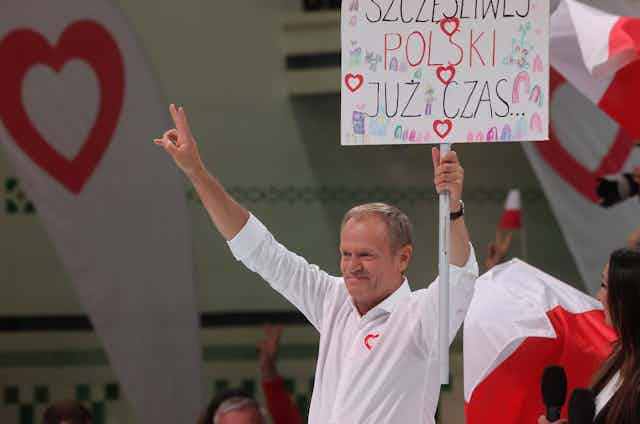People were seen queuing in long lines outside polling stations in what appears to have been an election with record-breaking turnout (74.31%) in Poland. Now it seems the right-wing Law and Justice party (PiS) is on the way out of government. Although PiS came away with the highest percentage of votes (35.38%), a coalition of opposition parties looks more likely to end up in power.
The Civic Coalition (KO), an alliance of centre-right parties led by former European Council president Donald Tusk, has secured 157 seats in parliament. This itself is shy of the 231 needed to form a majority but combining with Third Way, a centrist alliance which took 65 seats, and the New Left, which took 26 seats, a government is possible.
PiS took 194 seats by itself but this is not enough to form a government alone or in cooperation with the far-right Confederation (KON), which took just 18 seats. Even in an election not considered entirely fair, the party that has ruled Poland since 2015 could no longer cling to power.

The return of Donald Tusk
Since coming to power in 2015, PiS has acted with antagonism towards the European Union. This would appear to be out of step with public opinion given that support for the EU stands at 85% (and overt opposition just 10%) in Poland.
Even though Poland is a net financial beneficiary of the union, PiS has clashed with Brussels for failing to uphold European democratic values and human rights for women and LGBTQ+ people.
Tusk has vowed to turn back towards European Union partners and for Poland to keep pace with them on social issues, such as by introducing same-sex marriage. Women, who have seen their rights to abortion care ultimately vanish under PiS, can be hopeful of a shift back towards liberalisation under a Tusk administration. Tusk has said PiS has “dehumanised” too many people during its time in power. Ever since his first stint as prime minister between 2007 and 2014 (when he was appointed president of the European Council) Tusk has always been seen as a pro-European force.
Relations with the EU over Ukraine should also become less tense. PiS recently acted unilaterally and against the EU’s wishes by banning grain imports from war-torn Ukraine because it would hurt national farming interests. Tusk can be expected to be more prepared to align with European allies.
A Tusk-led government is expected to liberalise abortion (up to 12 weeks) and introduce the right for same-sex couples to form legally recognised civil partnerships. It is also expected to undertake reforms to bring back judicial and media freedom. The goal appears to be nothing short of bringing Poland back into the group of European liberal democracies. As Tusk himself put it: “It’s the end of the evil times”.
The demise of PiS
The PiS years have been characterised by a gradual dismantling of Poland’s liberal democratic order. Checks and balances on the government have disappeared and the separation of powers undermined by the deliberate erosion of judicial independence. V-DEM, the Varieties of Democracy project, based at the University of Gothenburg in Sweden, considers Poland a case of “engulfed in autocratization”, making it a place where democracy is threatened. The end of communism brought democracy and European Union membership but the year 2015 marked a turning point. Donald Tusk and KO have won because Poles did not want to become an electoral autocracy, as forecast in the event of an unprecedented third term for PiS. The electoral results constitute a real “victory for democracy” (as Tusk said).
With time, and the fatigue of governing, PiS has clearly lost support. Economic challenges and increases to the cost of living have evidently taken a toll, with the economy cited as the the most important issue for voters. PiS attempted to push immigration up the agenda during the campaign rather than tackling these issues head on. But these were not convincing, particularly when combined with accusations that the government was issuing significant numbers of visas to Russians and that consular officials were offering visas to people coming from Asia and Africa in return for kickbacks.

Not quite a done deal…
While Poland looks set to have a pro-European government in office soon, that result is not yet guaranteed. A new government might not be appointed until mid-December as PiS will try to attract support from some of the Third Way members and Tusk will need some time to accommodate the demands from the six parties that are expected to have a ministerial presence.
Andrzej Duda, president of the Polish Republic (and a PiS member), needs to decide who should form a government. Following established tradition, his first choice will be PiS because it was the most voted for party, even if it doesn’t have a majority. If the opposition parties together are able to form a majority, they may have a chance; if recent years tell us anything, it’s that PiS is willing to manoeuvre to stay in power.
And even if the opposition coalition does land in government, their alliance will not be an easy one. There are many parties involved and ideological differences aplenty. The talks will involve liberals, Christian-democrats, agrarians, social democrats and the radical left, so negotiations could be lengthy. If Duda fails to find a government after three attempts, he will have to dissolve parliament and call fresh elections.

